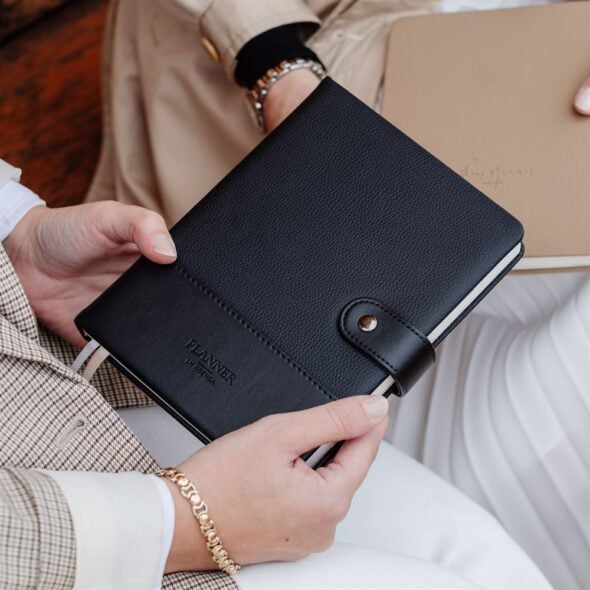Do you love flexing your conversation muscle? Or do you run a mile when a big or difficult conversation presents itself? Whether you’re meeting with someone new, speaking with colleagues or connecting with your partner, there’s more to conversation than just a verbal exchange.
The conversations we have, and the way in which we have them, hugely impact our work and the quality of our relationships. But sometimes it can be tempting to avoid difficult conversations, or go into a conversation only really half listening. So, how can we have productive conversations and get the best outcomes for everyone involved – including ourselves?
Did you know our award-winning planners and journals are designed in collaboration with industry experts? They feature mindset, productivity and leadership content to inspire and empower you.
Being present, preparing correctly and removing preconceived ideas are all ways we can improve our conversations, but often we’re too distracted or worried to really make the conversations we have a truly meaningful exchange.
Here are some key tips on how to make the most of your conversations.
The power of perspective
Understanding someone else’s perspective and truly considering things from their point of view has huge power. It leads the path to connection, communication and conflict resolution. As children we’re encouraged to ‘put ourselves in someone else’s shoes’, but as adults we often forget to consider other people’s perspectives. The result? We take part in conversations in a way which is only half there.
By understanding someone else, a whole other world opens up. It becomes difficult to blame and shame people when you understand that they, just like you, just want to be content in their own way.
Tip: next time you’re having a conversation, try to truly be open and present to the other person and their point of view. Practice mindfulness rather than mindlessness.
Add curiosity to your toolbox
Curiosity is a powerful thing for our conversations. Being curious and open means asking questions rather than just making statements. Think about why your clients, customers or colleagues will be impacted by your decisions, and think about what it means for them, not just how it benefits you.
Ask, rather than assume to improve your understanding. Try questions such as:
- Can you tell me more about that?
- And what else?
- It sounds like you’re saying… Is this correct?
- Can you help me understand better?
Try this: if you struggle to listen in a truly present way, try a physical cue to stop yourself from interrupting other people or making assumptions. For example sit on your hands, cross your legs or hold your pen. This can be a cue to you to respond with a question, rather than a statement.
Listen more deeply
Listening deeply to someone with complete focus helps you to understand more about them – you start to see the story behind the words, the emotions conveyed by their body language, and what is at the heart of what they’re saying.
You become ‘other people centric’ by listening to understand, rather than just listening to solve. How often have you been frustrated by a friend or partner when they’ve responded to your confession of a problem with an irrelevant solution? So often in our conversations we’re focused on solving someone’s problems, rather than just giving them a safe space to speak.
If you are brutally honest with yourself, how well do you really listen to the important people in your life? And how well do you feel listened to?
Dealing with discomfort
Worrying about an upcoming conversation? We’ve all been there.
Whether it’s giving negative feedback on someone else’s work, negotiating a pay rise, or asking a housemate to do their share of the cleaning, uncomfortable conversations are just part of being human.
Living a life on your own terms takes courage, which means sometimes you need to get out of your comfort zone when you’re having conversations. Some of us struggle to say no or worry about whether or not people will like us. Or waste hours thinking about what the outcomes might be, but if we don’t have those difficult conversations, then we aren’t paving the way for real change.
The power of no
Sometimes we feel obligated to say yes – we want to be helpful, but it means we over-commit to tasks which drain our energy. Saying yes to help someone else is all well and good, but not if it’s taking away time from you to do the things that bring you joy and meaning.
Of course saying no can be awkward in the moment, but the more you do it the easier it gets. Say goodbye to resentment and hello to productive, meaningful opportunities.
Focus on what you’ll gain, rather than what you’ll lose.
Preparing for a tough conversation
If you’re more accustomed to being ‘nice and polite’ than having tough conversations, here are some ways to tackle them.
- Prepare: Preparation and thought ahead of the conversation mean you’ve got the information you need to answer potential questions and challenges.
- Clear the decks: Try to start the conversation with a clear and open mind, rather than holding onto preconceived ideas and expectations.
- Perspective: Remember why you’re there, and that feelings of discomfort are temporary. The experience is a path to growth.
Timing: The longer you put off having the conversation, the more it takes on a life of its own as the expectation builds. Jump in and have the conversation now, rather than leaving it for months when it’s become irrelevant to the other party.
Do you fear feedback?
Receiving feedback can be uncomfortable and damage our self-confidence, but try taking yourself out of the process so you can accept feedback as information rather than a personal attack. By using feedback as a catalyst for change, it helps you to grow as a leader, and to continually improve your approach. Taking pride in your success, but also learning from your mistakes, are both hugely valuable.
Ask for what you want and need
If you ask for what you need and want with clarity and purpose, then it provides opportunities for you to work collaboratively with others on a shared purpose. Asking for help and support does not mean you’re needy or a failure. In fact, when you ask someone to help you, quite often they feel needed, wanted and important as a result. So you both win.
It’s important to ask for what you want, rather than assuming other people know or care about what is important to you. Be really clear about what you’re asking for.
Create agreements rather than expectations
When we set expectations which aren’t met, the result is blame and feelings of frustration and disappointment. But when we set agreements, we’re creating mutually agreeable arrangements, where both parties determine what is required and when it will be executive. The focus is on the how, what and when, and clearly outlining what the results need to be and what ‘done’ looks like.
By articulating exactly what ‘done’ looks like to your teammates, partner or family members, you’re providing clarity to a conversation and giving people clear tasks to focus on. Agreements eliminate frustration and anger, as they give you more clarity and focus on how to move things forward.
At the end of the day, we’re all humans and no two conversations will be the same. But when you go into each conversation with an open mind, open ears, and clarity around what is being agreed, you’re much more likely to walk away feeling fulfilled, or excited by the new opportunities which you’ve opened up.
 About the Author
About the Author
Danielle gives practical and informed tips on how to rewrite the gender code which creates pressures and limits our potential as women, and provides tools and strategies to create individual solutions for your unique context. If you would like to dig into this deeper you can purchase Danielle’s book, Breaking the Gender Code – which shows how women can use what they already have, to get what they actually want.



